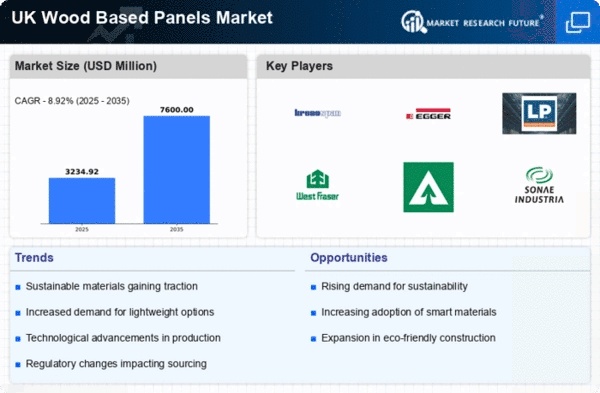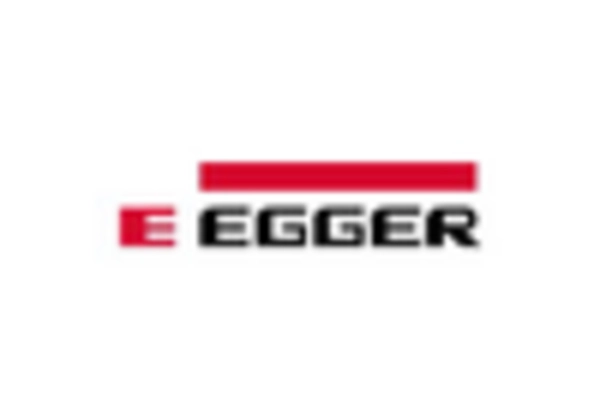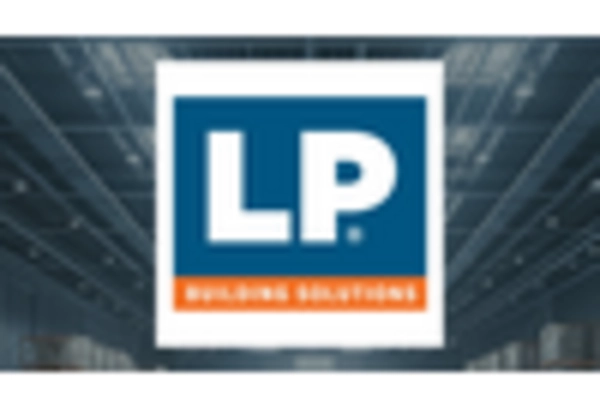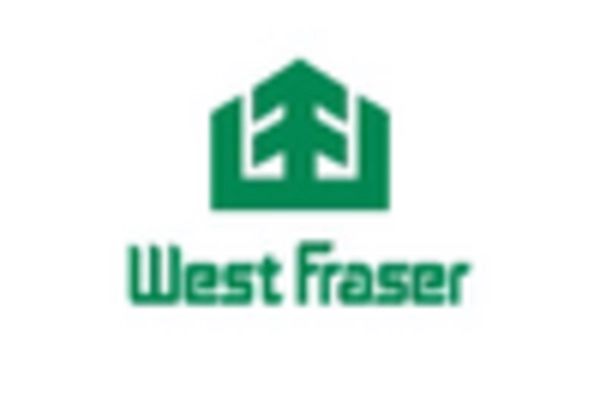Shifts in Consumer Preferences
Shifts in consumer preferences are significantly impacting the wood based-panels market. As consumers become more discerning, there is a growing inclination towards products that offer both aesthetic appeal and functionality. This trend is particularly evident in the furniture and interior design sectors, where wood based-panels are increasingly favored for their versatility and design potential. Additionally, the rise of DIY culture has led to an increased demand for wood based-panels among consumers looking to undertake home improvement projects. This evolving consumer landscape suggests that manufacturers must remain agile and responsive to changing preferences to maintain relevance in the wood based-panels market.
Growth in the Construction Industry
The growth of the construction industry in the UK significantly influences the wood based-panels market. With ongoing urbanization and infrastructure development, the demand for wood based-panels is expected to rise. Recent data indicates that the construction sector has seen a resurgence, with an increase in new housing projects and commercial developments. This growth is likely to create a robust demand for wood based-panels, which are essential for various applications, including flooring, wall panels, and furniture. As the construction industry continues to expand, it is anticipated that the wood based-panels market will benefit from increased orders and production, thereby enhancing overall market dynamics.
Government Regulations and Initiatives
Government regulations and initiatives play a crucial role in shaping the wood based-panels market. The UK government has implemented various policies aimed at promoting sustainable forestry practices and reducing carbon emissions. These regulations often encourage the use of certified wood products, which can enhance the market for wood based-panels. For instance, the introduction of stricter building codes that mandate the use of sustainable materials is likely to drive demand. Additionally, government incentives for using renewable resources may further stimulate growth in the wood based-panels market. As a result, manufacturers are increasingly aligning their production processes with these regulations to ensure compliance and capitalize on potential market opportunities.
Rising Demand for Eco-Friendly Products
The wood based-panels market is experiencing a notable increase in demand for eco-friendly products. This trend is largely driven by heightened consumer awareness regarding environmental sustainability. As more consumers seek sustainable alternatives, manufacturers are compelled to innovate and produce panels that meet these expectations. In the UK, the market for eco-friendly wood based-panels is projected to grow at a CAGR of approximately 6% over the next five years. This growth is indicative of a broader shift towards sustainable building materials, which is likely to influence purchasing decisions across various sectors, including construction and furniture. Consequently, companies that prioritize sustainability in their product offerings may gain a competitive edge in the wood based-panels market.
Technological Innovations in Manufacturing
Technological innovations in manufacturing processes are transforming the wood based-panels market. Advances in production techniques, such as automated processes and improved adhesives, are enhancing the quality and efficiency of wood based-panels. These innovations not only reduce production costs but also enable manufacturers to create panels with superior properties, such as enhanced durability and moisture resistance. As a result, companies that adopt these technologies may experience increased competitiveness in the market. Furthermore, the integration of digital technologies, such as AI and IoT, is likely to streamline operations and improve supply chain management, thereby positively impacting the wood based-panels market.
















